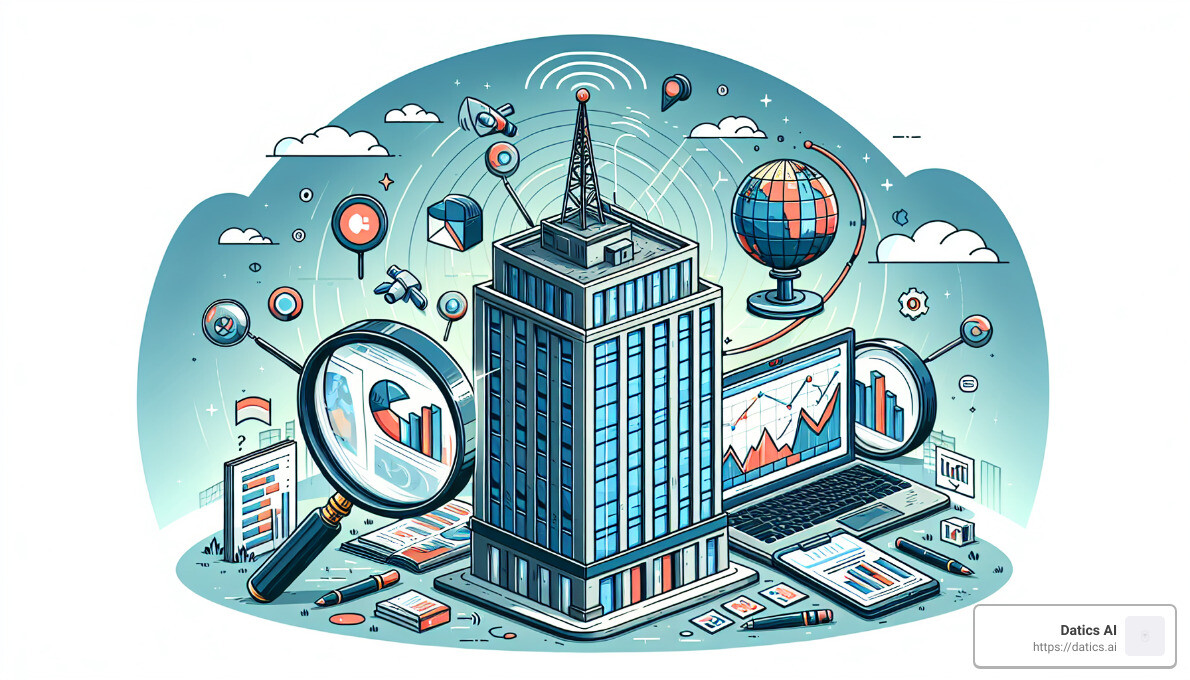Why Business Intelligence Tools are Important
Business intelligence tools are the key to open uping valuable insights that can guide your business decisions. These tools help companies turn raw data into actionable information, supporting better decision-making and strategic planning.
In today’s business environment, having the right tools to analyze and visualize data is critical. Business intelligence tools enable organizations to collect data from various sources, process and analyze it, and then present it in user-friendly formats like dashboards, reports, and charts. This comprehensive view helps companies identify trends, spot opportunities, and address potential issues before they escalate.
I’m Umair Majeed, and I’ve spent years working with business intelligence tools to help companies grow smarter and more efficient. With my background and commitment to leveraging data insights for business success, I can guide you through selecting the best tools for your needs.
What are Business Intelligence Tools?
Business intelligence tools are software applications designed to collect, process, and analyze large volumes of data from various sources. These tools help businesses make informed decisions based on data insights.
Definition
At their core, business intelligence (BI) tools are systems that transform raw data into meaningful information. They allow businesses to gather data from multiple sources, analyze it, and present it in a digestible format like dashboards, reports, and charts.
Purpose
The primary purpose of BI tools is to help businesses make better decisions. By providing insights into market trends, customer behavior, and operational performance, these tools enable companies to identify opportunities for growth, improve ROI, and gain a competitive edge.
Data Collection
BI tools collect data from a variety of sources, including:
- Internal Systems: Databases, CRM systems, ERP systems
- External Systems: Social media, market research, public records
For example, a retail company might use BI tools to collect sales data from its POS systems, customer feedback from social media, and market trends from industry reports.
Data Analysis
Once data is collected, BI tools process and analyze it to uncover patterns and trends. This involves:
- Data Mining: Identifying hidden patterns in large datasets
- Predictive Analytics: Forecasting future trends based on historical data
- Text Mining: Analyzing text data from documents, emails, and social media
Data Visualization
BI tools present analyzed data in visual formats that are easy to understand. Common visualization methods include:
- Dashboards: Interactive platforms that display key metrics and KPIs
- Charts and Graphs: Visual representations of data trends and comparisons
- Reports: Detailed documents summarizing data insights
Decision-Making
The ultimate goal of BI tools is to support decision-making. By providing real-time insights, these tools help businesses:
- Identify Trends: Spot emerging market trends and adapt strategies accordingly
- Optimize Operations: Improve efficiency by identifying bottlenecks and inefficiencies
- Improve Customer Experience: Tailor services and products to meet customer needs
For instance, a marketing team might use BI tools to analyze campaign performance, allowing them to allocate resources more effectively and improve ROI.
In the next section, we’ll dive into the top 10 business intelligence tools for 2024, examining their unique features and how they can benefit your business.
Top 10 Business Intelligence Tools in 2024
In this section, we’ll explore the capabilities and features of various business intelligence tools that are making a significant impact in the industry. These tools are essential for businesses looking to enhance their data-driven decision-making processes.
Datics AI Custom BI Solutions
Datics AI offers tailored business intelligence solutions that are designed to meet the specific needs of your business. Our custom BI tools integrate seamlessly with your existing systems and provide powerful data analysis, visualization, and reporting capabilities. With Datics AI, you can ensure that your business leverages data in the most effective way to drive success.
General BI Tool Features
While specific product names are not mentioned, it’s important to understand the general features that make BI tools valuable:
- Advanced Data Processing: Handles large volumes of data efficiently.
- Interactive Dashboards: Provides real-time insights through customizable dashboards.
- Predictive Analytics: Uses historical data to forecast future trends.
- Seamless Integration: Integrates with existing databases and software.
- User-Friendly Interface: Ensures ease of use for all users, regardless of technical skill.
These features are critical for any business intelligence tool and are what you should look for when considering a BI solution for your company.
Key Features to Consider When Choosing a BI Tool
Choosing the right business intelligence tool is crucial for leveraging data effectively in your business operations. Here are some key features to consider:
Data Integration
Look for a BI tool that integrates smoothly with your existing data sources to provide a unified view of your data.
Ease of Use
Select a tool that is user-friendly and allows users of all skill levels to generate insights without extensive training.
Scalability
Ensure the tool can scale with your business, handling more data and users as your company grows.
Cost
Consider both the upfront and ongoing costs of the BI tool to ensure it fits within your budget.
Support
Choose a provider that offers robust support options to help you maximize the tool’s value.
Customization
Opt for a tool that offers extensive customization options to tailor its functionality to your business needs.
By focusing on these features, you can select a business intelligence tool that not only meets but exceeds your expectations, driving significant value for your business.
Benefits of Using Business Intelligence Tools
Centralized Data
With business intelligence tools, all your data is collected and stored in one place. This helps companies gather information from various sources like databases, CRM systems, and ERP systems. A centralized data system allows for easier analysis and more accurate insights.
Example: A retail company can pull data from their online store, physical locations, and social media platforms to get a comprehensive view of their sales and customer behavior.
Self-Sufficiency
Gone are the days when only the IT team could access and analyze data. Modern BI tools empower every employee, regardless of technical expertise, to generate reports and insights.
Quote: “Now, any employee without technical expertise, even interns, can access and analyze data necessary for their respective teams.”
Predictive Analytics
With access to historical and real-time data, employees can make evidence-based decisions. Predictive analytics and forecasting tools help anticipate future trends and identify anomalies.
Fact: “If a business condition changes, the intelligent tools can automatically figure out the anomalies and you’ll be able to react to disruptions as they arise.”
Automatic Reports
BI tools automate the reporting process. Instead of manually inputting data into spreadsheets, you can generate reports automatically. This saves time and reduces errors.
Example: Need a report on product performance over the last quarter? A BI tool can generate it instantly, complete with interactive visualizations and downloadable charts.
Cost Reduction
BI tools make analyzing, planning, and reporting processes more efficient and accurate. This helps reduce business costs and increase revenue.
Statistic: “More than 50 percent of BI tools users reported that these benefits helped them reduce costs and increase revenue.”
Using business intelligence tools can transform your business operations, making them more efficient and data-driven. In the next section, we’ll answer some frequently asked questions about BI tools and their applications.
Frequently Asked Questions about Business Intelligence Tools
What is a Business Intelligence Tool?
A business intelligence tool is software that helps businesses collect, process, and analyze data to make better decisions. These tools pull data from various sources like documents, emails, and social media, then transform it into user-friendly formats like dashboards, charts, and reports.
Think of it as a boostd data assistant that helps you see patterns, predict trends, and make smart decisions based on solid data.
Is SQL a Business Intelligence Tool?
SQL (Structured Query Language) is not a business intelligence tool by itself, but it is a crucial part of the BI process. SQL is used to manage and query databases, allowing BI professionals to extract and manipulate data. Many BI tools use SQL under the hood to handle data operations.
In other words, while SQL helps you get the data, BI tools help you understand and visualize it.
Is Excel a Business Intelligence Tool?
Yes, Excel can be considered a business intelligence tool. It is widely used for data gathering, analysis, and decision-making. With features like pivot tables, charts, and Power Query, Excel can handle a lot of the tasks that specialized BI tools do.
In fact, many BI professionals start with Excel before moving on to more advanced tools. Plus, with Office 365, you can integrate Excel with other Microsoft tools like Power BI for even more powerful data insights.
By understanding these tools and their capabilities, you can better leverage data to drive your business forward. Next, we’ll dive into the key features to consider when choosing a BI tool.
Conclusion
Choosing the right business intelligence tool can make a significant difference in how effectively you leverage data to drive your business forward. We’ve explored various tools, each with its own unique features and strengths. Whether you’re looking for advanced data visualization, predictive analytics, or seamless integration with existing systems, there’s a BI tool out there that fits your needs.
However, selecting the right tool is just the first step. The real value comes from how you implement and use it. That’s where Datics AI comes in. We specialize in custom software development custom to your unique business requirements. Our end-to-end services ensure that every stage of your project, from initial consultation to post-launch support, is handled with expertise and care.
Why Choose Datics AI?
- Custom Solutions: We understand that every business is unique. Our custom software is designed specifically for your requirements, giving you a competitive edge.
- High-Quality: We adhere to the highest standards in software development. From design to deployment, we ensure that every aspect of your software meets rigorous quality benchmarks.
- Comprehensive Support: Our relationship doesn’t end with deployment. We offer continuous support and maintenance to ensure your software remains reliable and up-to-date.
By choosing Datics AI, you’re not just investing in a software solution; you’re partnering with a team committed to your success. Our business analysis consulting services are designed to streamline your operations, improve efficiency, and provide functionalities that off-the-shelf software simply can’t offer.
Ready to transform your business with custom software? Contact us today to get started on your software development journey.
By following these steps and leveraging the right BI tools, you can master data-driven decision-making and propel your business to new heights.




